Norman P. Ho writes and teaches in the areas of property law, legal theory, Chinese legal history, and law and the humanities (especially the intersections between law and music). Prior to joining STL, Professor Ho practiced law in the law firms of Slaughter and May and Morrison & Foerster LLP. Based in Hong Kong, his practice focused on a wide range of capital markets, private equity, and M&A transactions, as well as U.S. securities law compliance matters. He also previously taught as a lecturer in the University of Hong Kong Faculty of Law and has served as a Visiting Fellow at the Center for Chinese Law (University of Hong Kong) and as a visiting professor and Asian Law Institute Visiting Fellow at the National University of Singapore Faculty of Law. Professor Ho has also served as a Visiting Professor of Law at Northern Kentucky University Salmon P. Chase College of Law (teaching US property law).
By affiliation, Professor Ho also serves as an honorary fellow of the University of Hong Kong’s Asian Institute of International Financial Law and as an affiliated scholar in the Transnational Legal History Group of the Chinese University of Hong Kong’s Center for Comparative and Transnational Law. He received his A.B. and A.M. degrees from Harvard University and his J.D. from New York University School of Law, where he received the Howard L. Greenberger Prize for Outstanding Achievement in Comparative Law. He also holds an M.A. in Music (with Distinction) from The Open University (UK).
Watch some of Norman P. Ho’s lectures:
YouTube link: Thinking about Law through Music
Bilibili link: Thinking about Law through Music
YouTube link: Law and Music: Tchaikovsky and the Law
Bilibili link: Law and Music - Tchaikovsky and the Law
YouTube link: Law and Music: Schumann and the Law
Bilibili link: Law and Music - Schumann and the Law
YouTube link: Confucianism and Chinese Law, Past and Present



